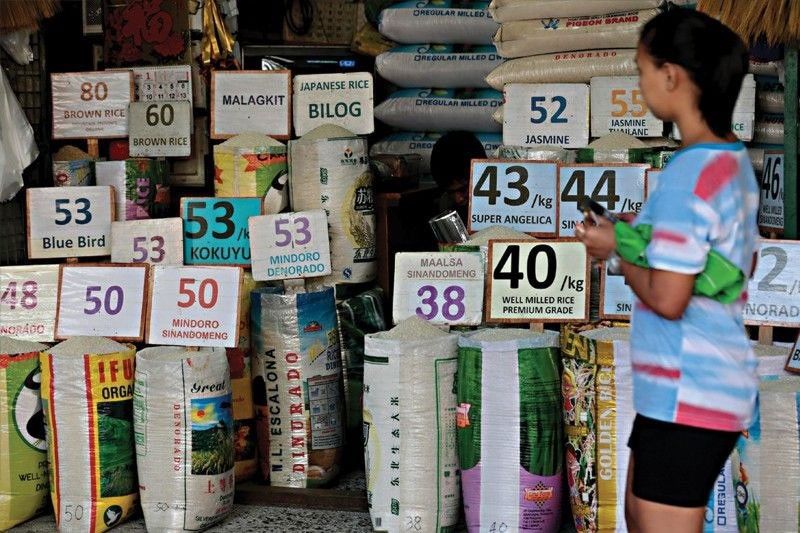President Marcos says that the government is inching toward its goal of lowering the price of rice to P20 per kilo.
During his speech yesterday on the launch of the Kadiwa ng Pangulo program in Pili, Camarines Sur, Marcos said the government is shouldering the hidden costs in the transportation of farmers’ products so these could be sold to consumers at lower prices.
He added that his administration’s decision to increase the number of Kadiwa outlets – stores that offer lower-priced products – has yielded positive results.
“For example, rice. My goal before assuming office is to lower the price of rice to P20 (per kilo). Hindi pa tayo umaabot doon, dahan-dahan palapit. Nasa P25 na lang tayo. Kaunti na lang, maibababa natin ‘yan (We are not yet there. We are inching towards that. We are at P25 per kilo. We are nearing that, we can lower that),” the President emphasized
The P20 per kilo was one of the campaign promises Marcos made during the 2022 presidential race. The Kadiwa outlets sell rice for P25 per kilo, so far the Marcos gov’t has launched more than 500 Kadiwa ng Pangulo outlets nationwide to help farmers and producers secure direct access to markets.
In an interview with reporters, Marcos, also the agriculture secretary, said he wants to see the P20 per kilo rice “as soon as possible. “Yesterday if not sooner. All my timetables are ‘yesterday, if not sooner’,” he said.
However, farmers’ group Samahang Industriya ng Agrikultura (SINAG) cautioned Marcos yesterday, saying the P20-per-kilo rice should not result in a drop in farmgate prices of palay.
Jayson Cainglet, SINAG executive director, said that the government should subsidize the lower prices of rice.
“At subsidized rates for the benefit of consumers, rice at P20 per kilo is possible and we welcome that if it will be a government policy to subsidize the retail prices of rice but not at the expense of depressing farmgate prices,” Cainglet pointed out.
Cainglet noted that the current farmgate prices of palay ranged between P23 and P23.50 per kilo, which would mean that the retail prices “without government intervention, will hover around P42 to 46 per kilo.”
According to Cainglet, imported rice also went up amid the spike in the global price due to the high cost of farm inputs, fuel and the depreciation of peso to the dollar.
“We hope the economic managers would not succumb in advising the President to push for more rice imports in the guise of the P20 per kilo of rice and they should only give the right information to the President. We can only ultimately lower the retail cost of rice if we can introduce interventions that would lower the cost of producing palay, cut post-harvest losses and remove non-productive players in the whole supply chain of the rice industry,” he added.
Rice price watch dog Bantay Bigas meanwhile slams the presidents’ statement on P20 rice per kilo is almost reachable. According to the group, the price of rice rose P4 per kilo in the market.
Bnatay Bigas said that the P20 Marcos campaign promise disappeared like a bubble as part of his major agenda. “It turns out that the P20 per kilo of rice was just a tactic to convince the public to vote for him. He has no intention to honor it. This further aggravates the situation of ordinary consumers as the National Food Authority (NFA) has stopped selling P27 and P32 per kilo of rice in the market”.
“Dahil sa hindi nga pinapalakas ang lokal na produksyon at hindi iniistabilisa ang farm gate price ng palay at presyo ng bigas sa pamilihan, paulit-ulit lang ang ganito. Pabor na naman sa mga pribado at dayuhang traders ang pagtaas ng presyo ng bigas ngayon,” ayon kay Cathy Estavillo, Amihan Secretary General at Bantay Bigas spokesperson.
Sa kabilang banda, dumadaing pa rin ang mga magsasaka sa napakataas na gastos sa pagsasaka. Noong 2022, umaabot ng 23% o P23,000 ang gastos sa abono at pestisidyo mula sa kabuuang gastos na mahigit P60,000. Hanggang ngayon, panawagan pa rin ng mga magsasaka ang ayuda mula sa gubyerno.
Panawagan ng mga grupo ang pagpapabasura sa Republic Act 11203 Rice Liberalization Law na nagresulta ng pagkalugi na umabot sa P261 billion sa loob ng 4 na taon. Mas mataas pa ito sa nakolektang taripa na P46.6 billion ng 2019-2021.
Hindi rin bumaba ng P25 kada kilo ang bigas mula sa pinangako ng mga promotor ng Rice Liberalization Law.
Sa pagtatapos, panawagan nila na isabatas ang House Bill Rice Industry Development Act (RIDA) at gawing affordable at accessible ang bigas sa mga palengke.
